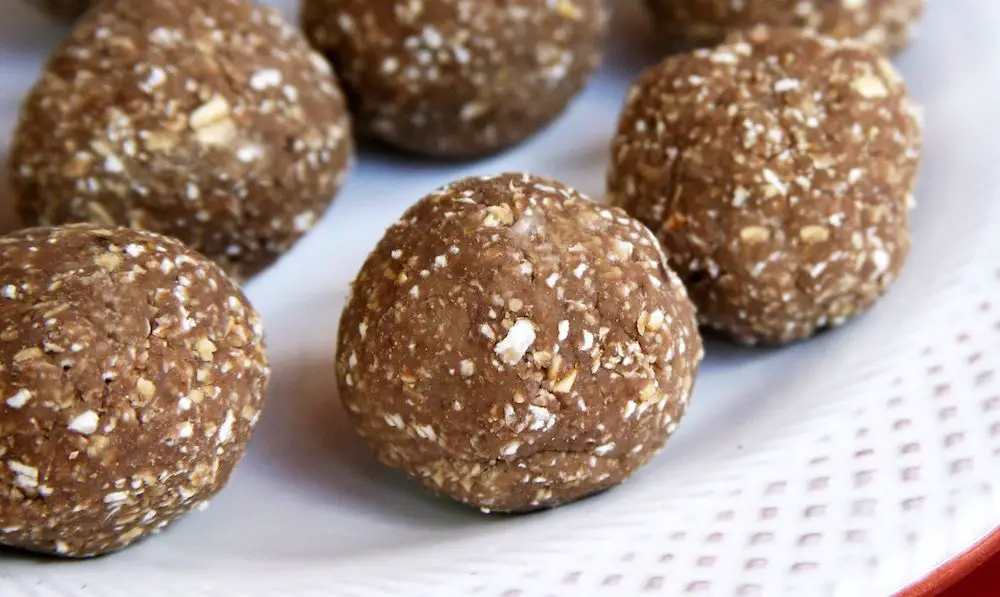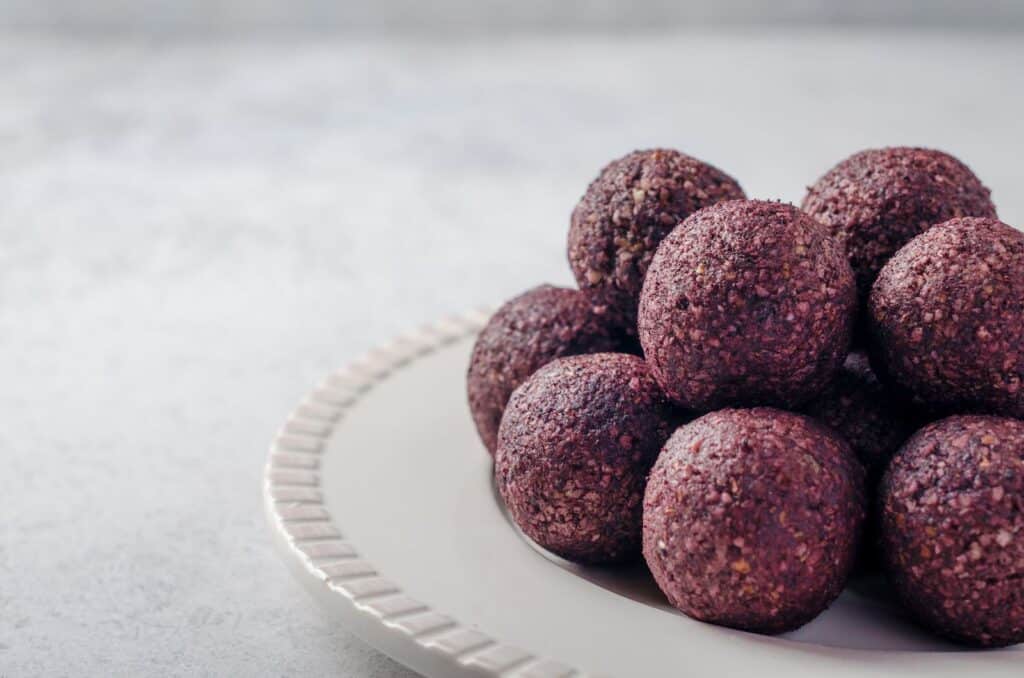Introduction
Are Protein Balls Good For Weight Loss: In the quest for effective weight loss strategies, individuals often find themselves navigating a plethora of dietary options and snack choices. One such option that has gained popularity in recent years is protein balls. These bite-sized, nutrient-dense snacks have become a go-to choice for many seeking to shed unwanted pounds while maintaining their energy levels and satiety. But are protein balls truly good for weight loss, or are they just another dietary trend? In this exploration, we will delve into the nutritional benefits and potential pitfalls of protein balls as a weight loss aid, shedding light on whether they deserve a place in your journey towards a healthier, slimmer you.
Protein balls, also known as energy bites or protein truffles, have garnered attention for their potential role in weight loss due to their composition and convenience. These snacks are typically made from a combination of ingredients such as protein powder, nuts, seeds, oats, dried fruits, and natural sweeteners like honey or dates. The primary selling point of protein balls is their high protein content, which is a macronutrient known for its ability to promote satiety, regulate appetite, and support muscle maintenance and growth.
Protein is known to increase feelings of fullness and reduce overall calorie intake. Including protein balls in your diet may help curb hunger between meals, potentially preventing overeating and snacking on less nutritious options. Many protein ball recipes are designed to be nutrient-dense, containing essential vitamins, minerals, and dietary fiber from ingredients like nuts, seeds, and oats. These nutrients are important for overall health and can contribute to a balanced diet.Protein balls come in small, pre-portioned servings, which can help with portion control and prevent mindless eating, a common pitfall in weight loss efforts.

How many protein balls should I eat in a day?
These protein energy balls have less than 100 calories each. Enjoy two or three for a well balanced and satisfying snack, without going overboard on your caloric needs.
Protein Needs
The recommended daily protein intake varies from person to person. Generally, protein requirements are influenced by factors such as age, sex, weight, and activity level. A sedentary individual may require less protein than an athlete or someone engaged in regular physical activity. The Dietary Reference Intake (DRI) suggests that the average adult should consume about 0.8 grams of protein per kilogram of body weight. However, for those who engage in regular exercise, protein needs may be higher, often ranging from 1.2 to 2.2 grams per kilogram of body weight.
Protein Content in Protein Balls
Protein balls are typically made with ingredients like nuts, seeds, protein powder, and sweeteners. These ingredients contribute to the overall protein content of the snack. On average, a single protein ball may contain around 5 to 10 grams of protein. However, this can vary widely depending on the recipe and brand. It’s essential to read the nutrition label on the packaging to determine the exact protein content of the protein balls you’re consuming.
Dietary Goals
Your dietary goals play a crucial role in determining the number of protein balls you should eat in a day. If your goal is to increase your protein intake to support muscle growth and recovery, you may need more protein balls. Conversely, if you’re looking to manage your calorie intake or maintain a specific weight, you’ll need to consider the calorie content of the protein balls in addition to their protein content.
Can I eat protein balls everyday?
“Everything in moderation.” , says Oscar Wilde. Too much of anything is never good for your body, so make sure you don’t overeat energy balls even though it’s healthy but some recipes can have high calories. So if you over-consume them, you might end up having too many calories in a day with no realization.
Nutritional Benefits
Protein balls can be a healthy addition to your daily diet, primarily due to their protein content. Protein is essential for various bodily functions, including muscle repair, immune system support, and hormone production. Consuming protein balls regularly can help you meet your daily protein requirements, especially if you have an active lifestyle or specific fitness goals.
Protein Quality
The quality of the protein in your diet matters. Protein balls often contain high-quality protein sources such as whey, casein, or plant-based proteins like pea or rice protein. These sources provide essential amino acids that your body needs for optimal health. If you choose protein balls made with high-quality ingredients, you can confidently incorporate them into your daily diet.
Portion Control
While protein balls can be nutritious, it’s crucial to practice portion control. Overeating any food, even a healthy one, can lead to excess calorie consumption, which may contribute to weight gain. Pay attention to the serving size and the number of protein balls you consume in a day to ensure you’re not exceeding your calorie goals.
Balanced Diet
Eating protein balls every day can be part of a balanced diet. However, it’s essential to consider the overall composition of your daily meals. A balanced diet should include a variety of food groups, such as fruits, vegetables, whole grains, lean proteins, and healthy fats. Protein balls can complement your diet as a snack or post-workout option, but they should not replace whole meals.
How many calories are in a protein ball?
1 protein ball contains: 160 calories, 11 grams of fat, 2 grams of fiber, 12 grams of carbs, and 7 grams of protein. These healthy protein balls are the perfect breakfast, easy snack, or healthy dessert!
Ingredients Matter
The calorie content of a protein ball largely depends on its ingredients. The primary components include nuts (such as almonds, cashews, or peanuts), seeds (like chia, flax, or sunflower seeds), a protein source (protein powder or ingredients like Greek yogurt), and sweeteners (honey, maple syrup, or dates). Each of these ingredients contributes to the overall calorie count.
Nutritional Variety
The variety of protein balls available in the market means that calorie counts can differ significantly. On average, a typical homemade or store-bought protein ball contains around 50 to 100 calories per ball. However, this range can vary depending on the size, recipe, and specific ingredients used. It’s essential to check the nutrition label on packaged protein balls for precise calorie information.
Protein Content
Protein balls are named for their protein content, but the protein itself contributes to the calorie count. Protein contains approximately 4 calories per gram. Therefore, a protein ball with 10 grams of protein will provide roughly 40 calories from protein alone. Keep this in mind when considering the total calorie content of a protein ball, as it may vary based on the protein content.
When should I eat protein balls?
You can eat our delicious peanut butter protein balls anytime day or night, but they can be especially useful if you eat them in conjunction with certain daily activities. Pre-Gym: Have a protein ball or two right before your workout for an extra energy boost so you can go further and longer.
Pre-Workout
Eating protein balls before a workout can be an excellent choice. The combination of protein and carbohydrates provides a quick source of energy, helping to fuel your exercise session. Consuming protein before a workout may also aid in muscle protein synthesis, promoting muscle growth and repair. Aim to eat a protein ball 30 minutes to an hour before your workout for best results.
Post-Workout
After a workout, your body requires nutrients to aid in recovery and muscle repair. Protein balls can serve as a convenient post-workout snack, supplying protein to support these processes. The carbohydrates in the balls can help replenish glycogen stores, which are depleted during exercise. Eating a protein ball within an hour after your workout can be an effective way to optimize recovery.
Between Meals
Protein balls make for a satisfying between-meal snack. When you feel your energy levels dropping between breakfast and lunch or lunch and dinner, reaching for a protein ball can help stave off hunger and provide a sustainable source of energy. The protein and healthy fats in the balls can help keep you feeling full and satisfied until your next meal.
What are the benefits of protein balls?
THEY’RE HIGH IN PROTEIN
Protein balls, as their name suggests, are a great source of protein. With the inclusion of protein powder plus other protein-rich ingredients such as nut butters, nuts, seeds and a variety of other ingredients, protein balls make for a great protein-packed snack and delicious treat.
Rich Source of Protein
As the name suggests, protein balls are an excellent source of protein. Protein is an essential nutrient that plays a crucial role in numerous bodily functions, including muscle repair and growth, immune system support, and hormone production. Protein balls provide an easily accessible way to increase your daily protein intake, making them particularly appealing to athletes and those with active lifestyles.
Sustained Energy
Protein balls are typically crafted with a balanced combination of protein, healthy fats, and carbohydrates. This blend of nutrients can provide sustained energy throughout the day. The slow release of energy helps stabilize blood sugar levels and prevents the energy crashes associated with high-sugar snacks, making protein balls an ideal choice for a mid-morning or afternoon pick-me-up.
Portability and Convenience
One of the standout benefits of protein balls is their portability and convenience. These snacks require no refrigeration and can be easily carried in a bag or lunchbox. This makes them a practical choice for busy individuals, travelers, and those looking for on-the-go nutrition. Whether you’re at work, on a hike, or running errands, protein balls are a hassle-free option.
Are protein balls worth it?
Yes! Protein balls are made using whole ingredients and are high in protein, so they’ll keep you feeling full for longer. They’re a great healthy snack idea that you can prep ahead.
Nutritional Value
One of the primary reasons people turn to protein balls is their nutritional value. They are often crafted with wholesome ingredients like nuts, seeds, and protein powder, which are rich in essential nutrients. If you have dietary goals that require increased protein intake, protein balls can be a convenient and tasty way to meet those goals.
Convenience
Protein balls are incredibly convenient. They don’t require refrigeration, making them suitable for on-the-go snacking. If you have a busy lifestyle or frequently find yourself in situations where healthy food options are limited, having protein balls on hand can be invaluable. They offer a quick and easy way to satisfy hunger and maintain energy levels.
Sustained Energy
Many protein ball recipes are designed to provide sustained energy. The combination of protein, healthy fats, and carbohydrates can help stabilize blood sugar levels, preventing energy crashes associated with high-sugar snacks. If you struggle with mid-morning or afternoon slumps, protein balls can be a worthwhile snack choice.
Can you eat protein balls at night?
During this week’s meal prep session, mix up some chia seed protein balls to keep in the fridge for late-night snacking. They’re rich in fiber and healthy protein and are sweet enough to feel like a dessert.
Protein and Sleep
Protein is an essential macronutrient that plays a role in muscle repair and various bodily functions. Some individuals believe that consuming protein before bedtime can have potential benefits, such as promoting muscle recovery during sleep. However, the relationship between protein intake and sleep is complex, and the effects can vary from person to person.
Slow Digesting Protein
If you’re considering eating protein balls at night, opt for those that contain slow-digesting protein sources like casein or a blend of proteins. Casein protein is known for its slower digestion rate, which can provide a steady release of amino acids throughout the night, potentially supporting muscle repair and recovery during sleep.
Caloric Considerations
One important factor to keep in mind when eating protein balls at night is your overall calorie intake. Consuming too many calories before bedtime can lead to weight gain, as your body’s energy expenditure tends to be lower during sleep. Ensure that the calorie content of the protein balls aligns with your daily caloric goals, especially if you’re trying to manage or lose weight.
Are protein balls good after a workout?
Protein balls are made with nuts, fruits and added protein powder. The fact that they are made with a few clean ingredients means they are great as an all-natural, healthy snack to replenish your body with protein and carbs after exercise.
Protein for Recovery
After a workout, your body requires essential nutrients to support muscle repair and recovery. Protein plays a crucial role in this process by providing the building blocks (amino acids) necessary for repairing and rebuilding muscle tissue. Protein balls, which are typically rich in protein, can be a valuable source of these amino acids, aiding in post-exercise recovery.
Convenient and Portable
One of the primary advantages of protein balls as a post-workout snack is their convenience and portability. They don’t require refrigeration and can be easily carried in a gym bag or backpack. This makes them a practical option for on-the-go athletes who need a quick protein source immediately after their workout.
Balanced Macronutrients
Protein balls often contain a combination of protein, healthy fats, and carbohydrates. This balanced macronutrient profile can be beneficial post-workout. While protein helps with muscle repair, carbohydrates help replenish glycogen stores, which are depleted during exercise. The healthy fats provide sustained energy and help keep you feeling full.
Slow Digesting Protein
For optimal post-workout recovery, it’s beneficial to consume a source of protein that digests slowly and provides a steady release of amino acids. Some protein balls are made with casein protein, which is known for its slow digestion rate. Casein can help maintain a positive protein balance in the hours following your workout, potentially enhancing muscle recovery.

Conclusion
Protein balls can indeed be a valuable asset in a weight loss journey, but their effectiveness ultimately depends on how they are incorporated into your overall diet and lifestyle. These nutrient-dense snacks offer benefits such as increased satiety, portion control, and valuable nutrients, thanks to their high protein and whole-food ingredient composition. However, it’s crucial to exercise caution and mindfulness when consuming protein balls.
Enjoy protein balls in moderation to avoid excess calorie intake. Even though they are nutritious, consuming too many can hinder your weight loss efforts. Opt for recipes that prioritize whole, unprocessed ingredients and minimize added sugars. Homemade protein balls with minimal additives are often the best choice. Protein balls should complement a balanced diet that includes a variety of foods, including lean proteins, fruits, vegetables, and whole grains. They should not be a sole source of nutrition.
In the end, protein balls can be a valuable tool in your weight loss toolkit, offering a convenient and nutritious way to support your goals. However, they should be part of a broader, balanced approach to diet and exercise, where overall calorie intake, macronutrient balance, and lifestyle factors are considered. Ultimately, success in weight loss is achieved through a combination of healthy eating habits, regular physical activity, and sustainable dietary choices.

